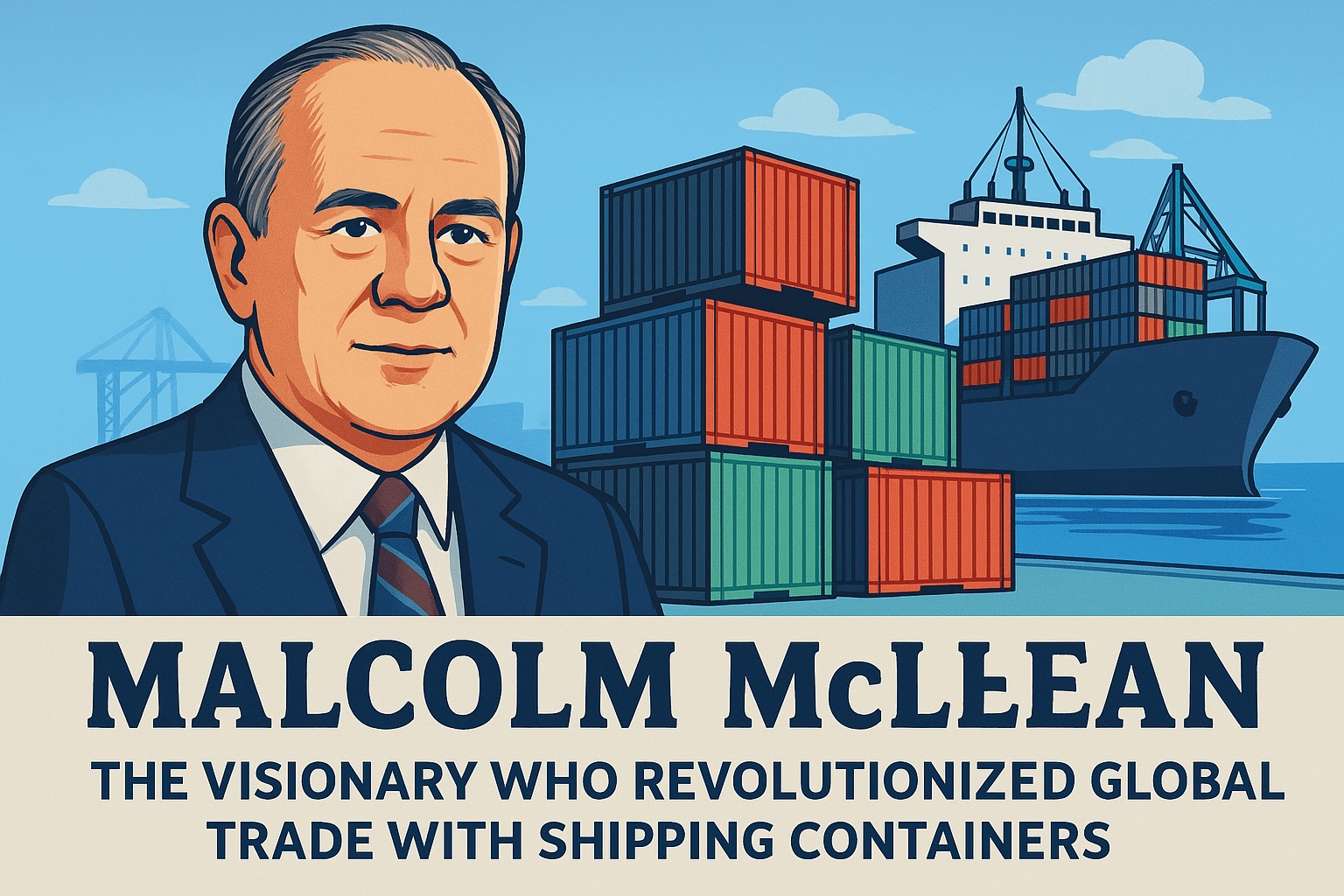Few inventions have transformed global commerce as profoundly as the humble shipping container. At the heart of this revolution was Malcolm McLean, a truck driver turned entrepreneur whose simple yet groundbreaking idea reshaped international trade, slashed shipping costs, and fueled globalization. His story is one of persistence, innovation, and an unwavering belief in efficiency—even when the world doubted him.
From Trucking to Transformation: McLean’s Early Insight
Born in 1913 in Maxton, North Carolina, McLean grew up in a farming family and started his career as a truck driver during the Great Depression. By 1935, he had founded McLean Trucking, which grew into the fifth-largest trucking company in the U.S.
But it was a frustrating day in 1937 that sparked his revolutionary idea. While waiting hours at a New Jersey dock to unload cotton bales from his truck onto a ship, McLean wondered: What if the entire truck trailer could be lifted onto the vessel without unloading its contents?
This moment of frustration led to a decades-long pursuit of a more efficient shipping method—one that would eliminate the slow, costly process of manually loading loose cargo.
The Birth of Containerization: The SS Ideal-X’s Historic Voyage
1950s
McLean refined his vision: detachable steel containers that could be stacked on ships, maximizing space and minimizing labor.
1955
Sold his trucking empire for $6 million and invested in Pan-Atlantic Steamship Company (later Sea-Land Service) to pursue container shipping.
April 26, 1956
The SS Ideal-X made history by sailing from Newark to Houston carrying 58 containers alongside liquid cargo.
The results were staggering:
- Cost savings: Loading loose cargo cost $5.86 per ton, while McLean’s containers reduced it to 16 cents per ton—a 36-fold efficiency gain.
- Speed: Traditional ships took weeks to unload; containers cut it to hours.
- Security: Sealed containers drastically reduced theft and damage.
Despite resistance from longshoremen (who reportedly said, “I’d like to sink that son of a bitch” about the Ideal-X) and skepticism from traditional shippers, McLean’s system proved unbeatable.
The Global Impact: How McLean’s Containers Changed the World
McLean’s innovation didn’t stop at U.S. coasts. His relentless expansion included:
1958
First regular container service to Puerto Rico
1966
First transatlantic container shipment to Europe (Rotterdam and Bremen)
1969
Transpacific routes, connecting Asia to global trade
By standardizing container sizes (20ft and 40ft), McLean enabled seamless transfers between ships, trucks, and trains—intermodal transport was born. The effects were profound:
- Globalization accelerated: Cheaper shipping made overseas manufacturing viable, linking economies like never before.
- Ports transformed: Cities like Singapore and Rotterdam boomed as container hubs.
- Consumer prices dropped: Goods became more affordable worldwide.
Legacy: The Unsung Hero of Modern Commerce
McLean’s later ventures—like Trailer Bridge and the SL-7 “Econoships”—kept pushing boundaries, but his greatest legacy remains the shipping container, now carrying 90% of global trade.
When he died in 2001, container ships worldwide blew their whistles in tribute. Forbes called him “one of the few men who changed the world”—yet his name remains surprisingly obscure.
— Malcolm McLean
Final Thoughts: Why McLean’s Story Matters Today
Malcolm McLean proved that innovation often comes from outsiders—a trucker who saw inefficiency and dared to fix it. His containers didn’t just move cargo; they moved history, enabling the interconnected world we live in today.
Next time you see a container ship, remember: behind those steel boxes is the story of a man who refused to accept “how things have always been done.”
Want to learn more? Explore the Logistics Hall of Fame’s tribute or watch documentaries on Port Newark’s role in the container revolution.
